Report Writing Course in Singapore
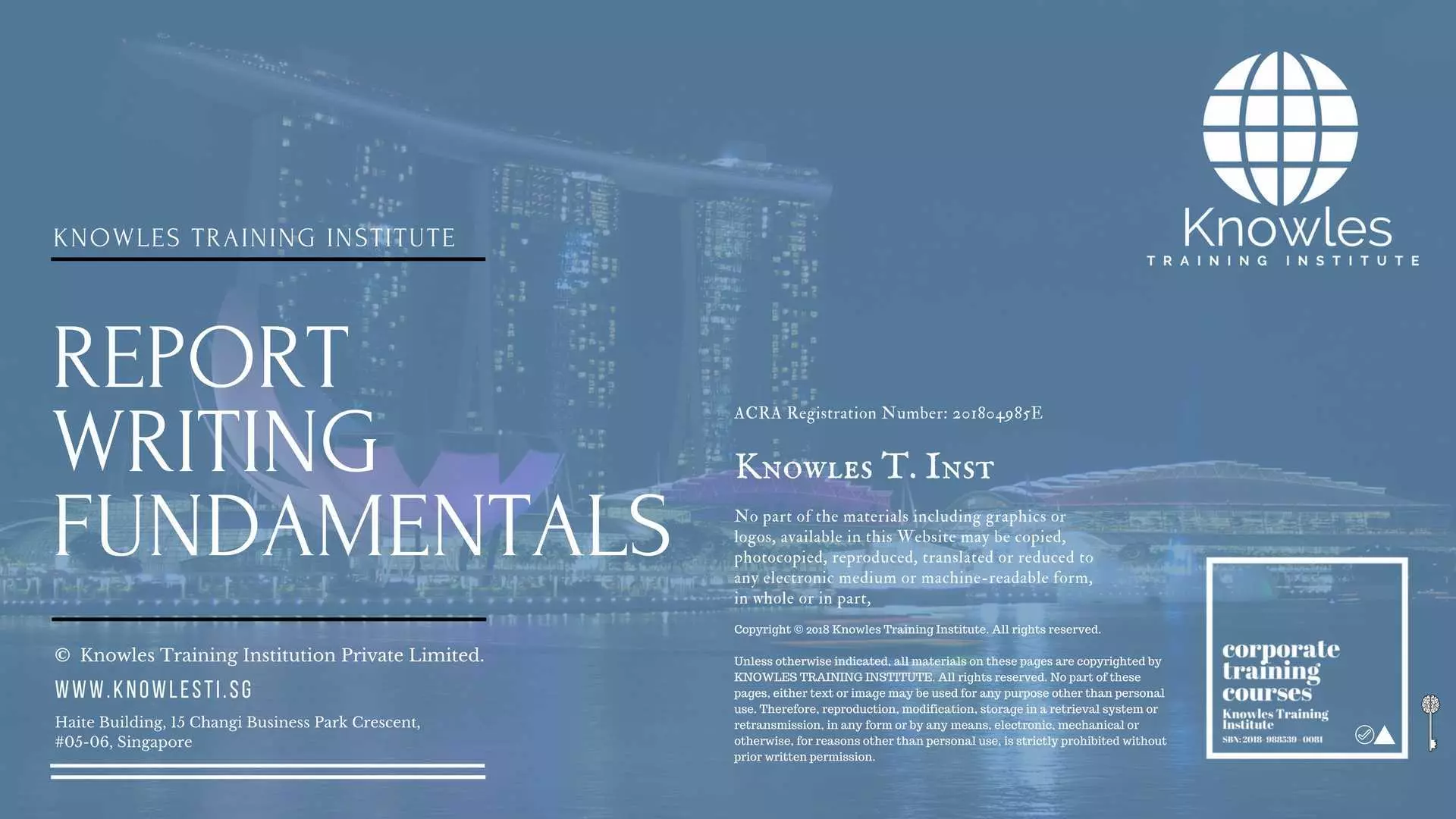
About This Report Writing Training Course Singapore
Report Writing Fundamentals Course in Singapore
About This Course
Writing a report in the workplace could range from simple memos to complex analysis of the latest product launch. Often, the problems being encountered in this task is what format to use and the appropriate layout for a certain topic. When these problems are addressed, the next would be to identify your target audience and to adjust your writing style accordingly.
Writing a work report is labor that needs deliberation and cannot be hurried. A writer must keep in mind the delicate information it could disclose and how certain facts could be interpreted the wrong way. With excellent writing skills, information could be disseminated effectively and decisions could be made based on facts and sound arguments.
This course will teach the participants the correct method of writing a report at work as well as the pertinent elements it should contain to produce a reliable source of information.
Course Schedule
| COURSES | DATES | TIME | VENUE | COUNTRY | REGISTRATION |
|---|---|---|---|---|---|
| Report Writing Course | 4 May, 2024 - 5 May, 2024 | 9 am to 5 pm | Online / Face to Face | Singapore | |
| Report Writing Course | 31 May, 2024 - 1 June, 2024 | 9 am to 5 pm | Online / Face to Face | Singapore | |
| Report Writing Course | 1 July, 2024 - 2 July, 2024 | 9 am to 5 pm | Online / Face to Face | Singapore | |
| Report Writing Course | 31 July, 2024 - 1 August, 2024 | 9 am to 5 pm | Online / Face to Face | Singapore | |
| Report Writing Course | 31 August, 2024 - 1 September, 2024 | 9 am to 5 pm | Online / Face to Face | Singapore | |
| Report Writing Course | 29 September, 2024 - 30 September, 2024 | 9 am to 5 pm | Online / Face to Face | Singapore | |
| Report Writing Course | 29 October, 2024 - 30 October, 2024 | 9 am to 5 pm | Online / Face to Face | Singapore | |
| Report Writing Course | 29 November, 2024 - 30 November, 2024 | 9 am to 5 pm | Online / Face to Face | Singapore | |
| Report Writing Course | 30 December, 2024 - 31 December, 2024 | 9 am to 5 pm | Online / Face to Face | Singapore |
Who Should Attend This Report Writing Fundamentals Workshop
This Report Writing Fundamentals workshop is ideal for anyone who would like to gain a strong grasp and improve their Report Writing Fundamentals.
All Staff Within An Organisation
Managers
Team Leaders
Executives
Assistants
Officers
Secretaries
Group Size For This Report Writing Fundamentals Training Program
The ideal group size for this Report Writing course is:
Minimum: 5 Participants
Maximum: 15 Participants
Course Duration For This Report Writing Fundamentals Skills Course
The duration of this Report Writing Fundamentals workshop is 1 full day. Knowles Training Institute will also be able to contextualised this workshop according to different durations; 2 full days, half day, 90 minutes and 60 minutes.
1 Full Day
9 a.m to 5 p.m
Report Writing Fundamentals Course Benefits
Below is the list of course benefits of our Report Writing Fundamentals course
Report Writing Course Benefits – Part 1
- Helps the participant construct a comprehensive and straightforward report that will be well-received by any audience.
- Enhances the participant’s written communication skills and personal writing style.
Report Writing Course Benefits – Part 2
- Gains a deeper understanding of plagiarism and its negative outcomes.
- Avoids confusion and misinformation that could be brought by a poorly written report.
Report Writing Course Benefits – Part 3
- Improves the participant’s ability to organize ideas and gathered information, as well as prioritizing the most important content.
- Develops the participant’s persuasive writing and influence which could impact decision-making in the workplace.
Course Content For This Report Writing Fundamentals Training Course
Below is the list ofcourse content of our Report Writing Fundamentals training course
Report Writing Course- Session 1: Course Overview
Report Writing Course- Session 2: The Stages of Report Writing
Report Writing Course- Session 3: The First Stage – Investigating For The Report
- Gathering Information
- Let’s Get Thinking!
Report Writing Course- Session 4: The Second Stage – Planning To Write The Report
- Choosing a Report Format
- Individual Activity
Report Writing Course- Session 5: The Third Stage – Writing The Report
Report Writing Course- Session 6: The Fourth Stage – Revising The Report
- Checklist for Success
- Spelling Test
Report Writing Course- Session 7: Using Headings In Your Reports
Report Writing Course- Session 8: Using Charts and Graphs In Your Reports
Report Writing Course- Session 9: The Proposal
- The Differences When Writing Proposals
- The Ten Steps of Proposal Writing
- Writing Exercise
Session 10: Persuasion
Session 11: Practical Application
Session 12:Conclusion
- Post-Course Assessment
- Pre- and Post-Assessment Answer Keys
- Personal Action Plan
Report Writing Fundamentals Value Added Materials
Each participant will receive the following materials for the Report Writing Fundamentals course
Report Writing Fundamentals Learner’s Guide
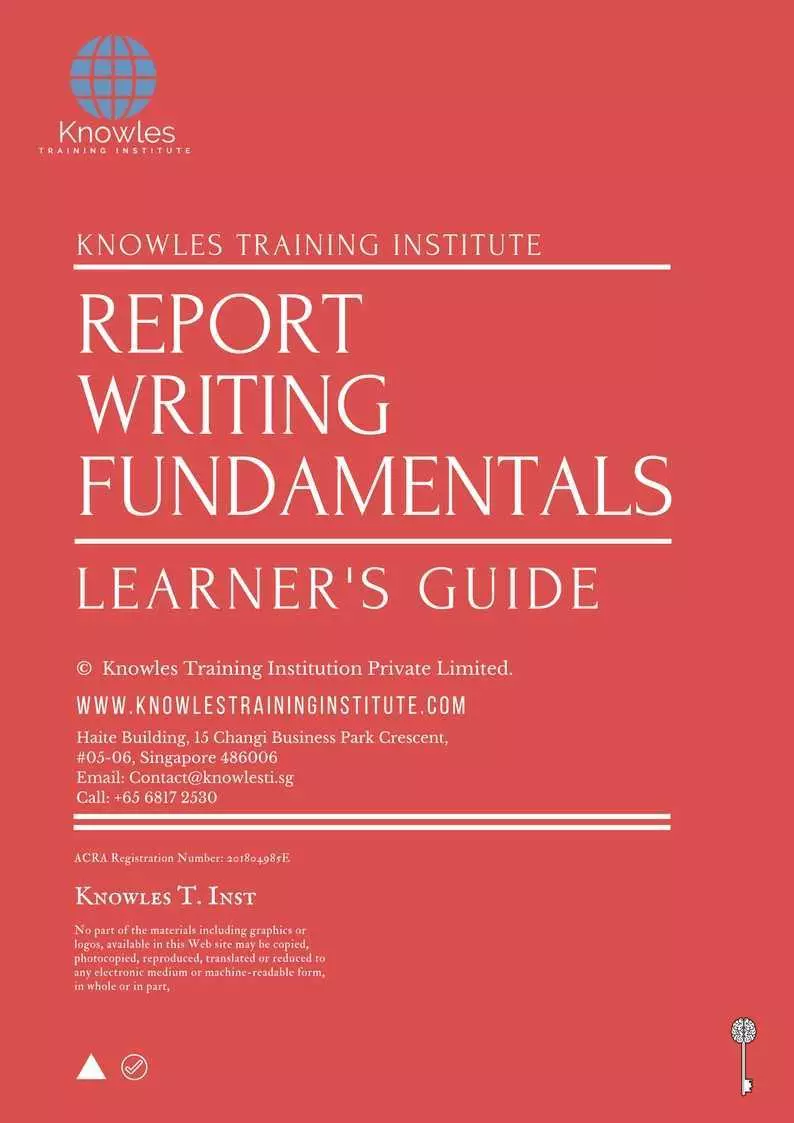
Report Writing Fundamentals Key Takeaways Notes
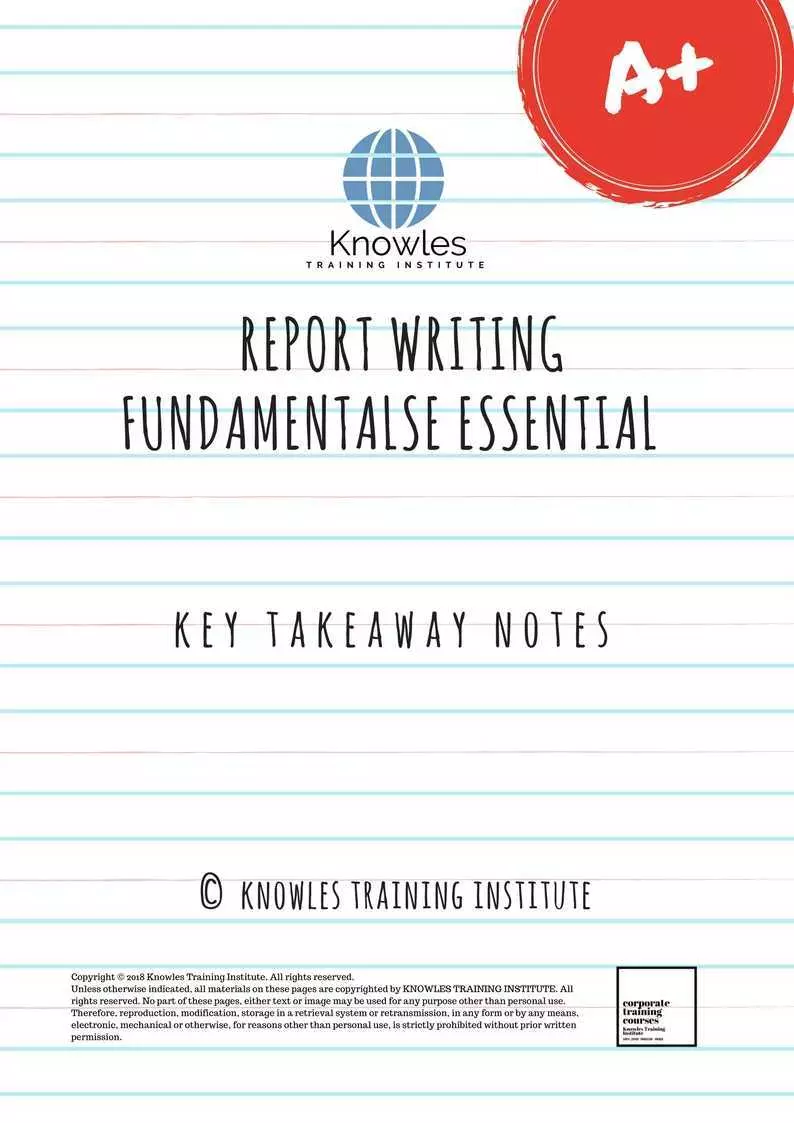
Report Writing Fundamentals Essentials Ebook
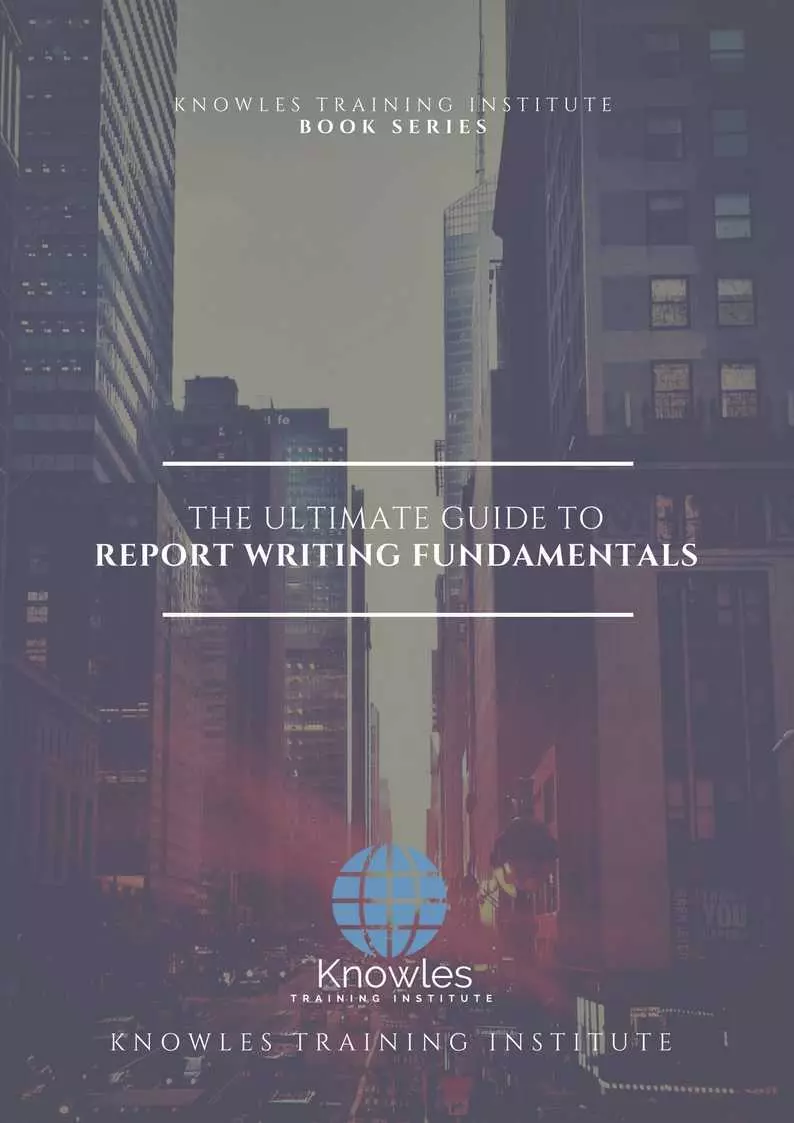
Report Writing Fundamentals Course Handouts
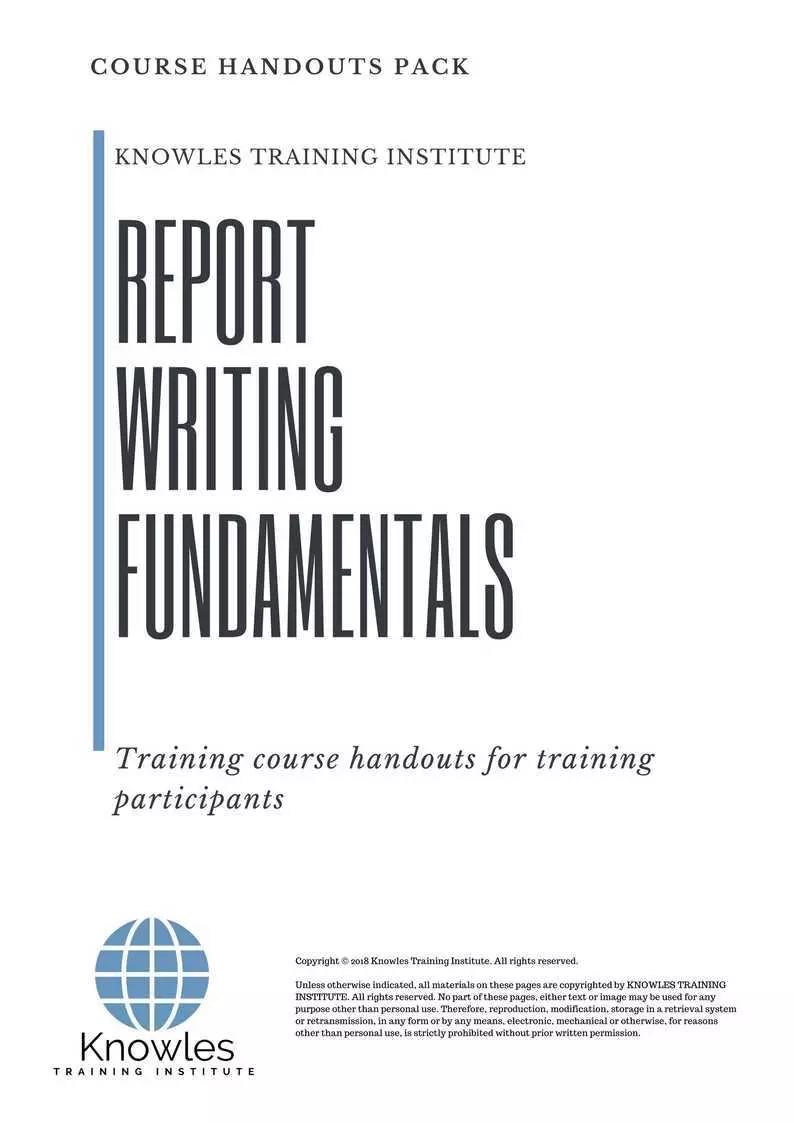
Report Writing Fundamentals 30-Day Action Plan
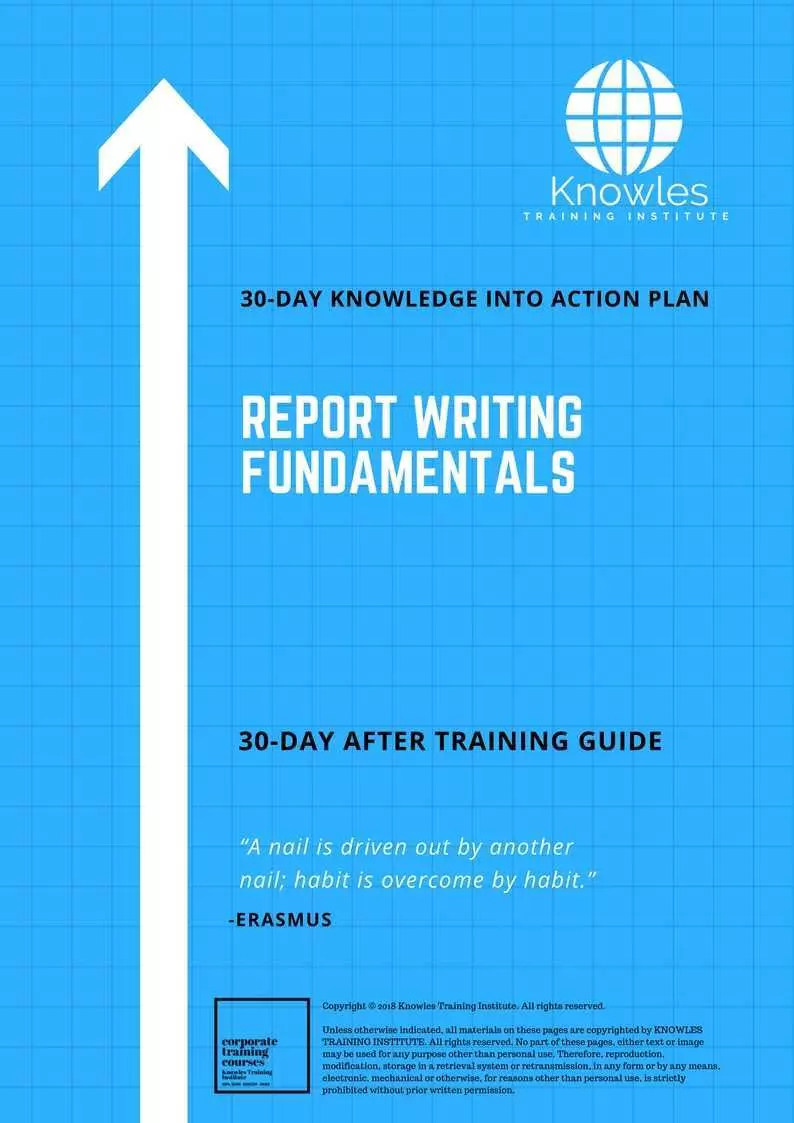
Report Writing Fundamentals MindMaps Pack
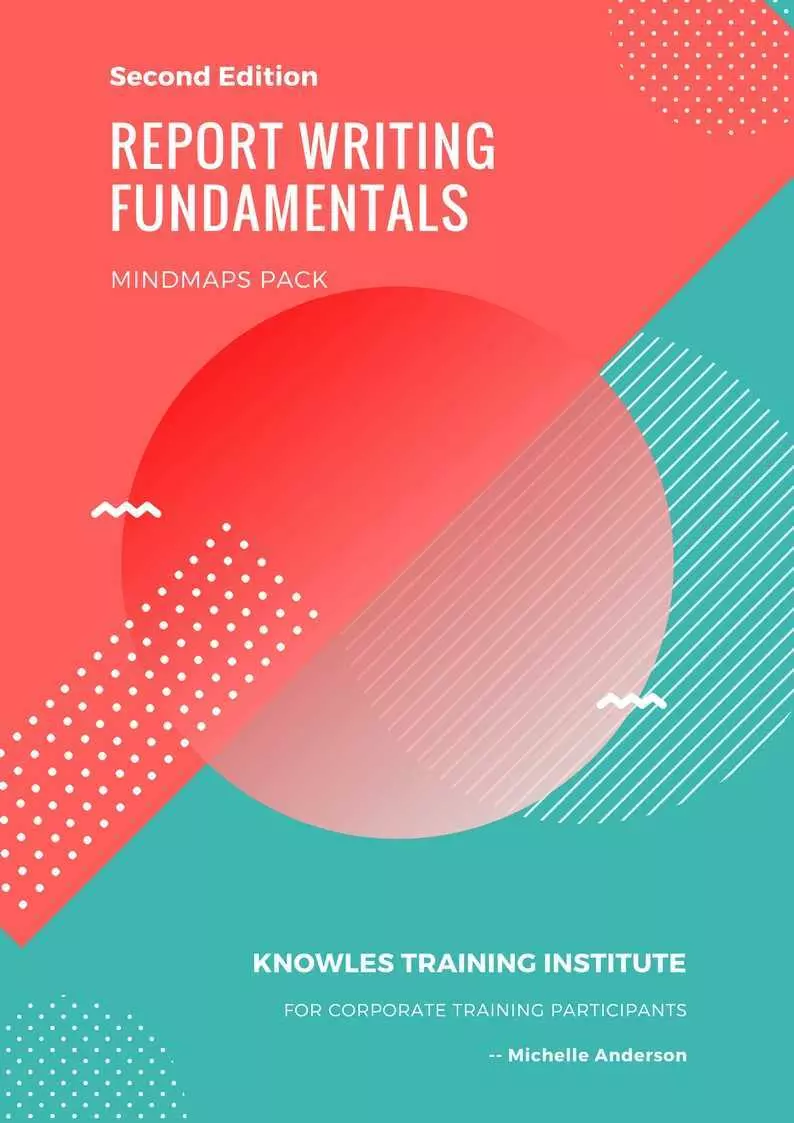
Report Writing Fundamentals PPT Slides Used During Course
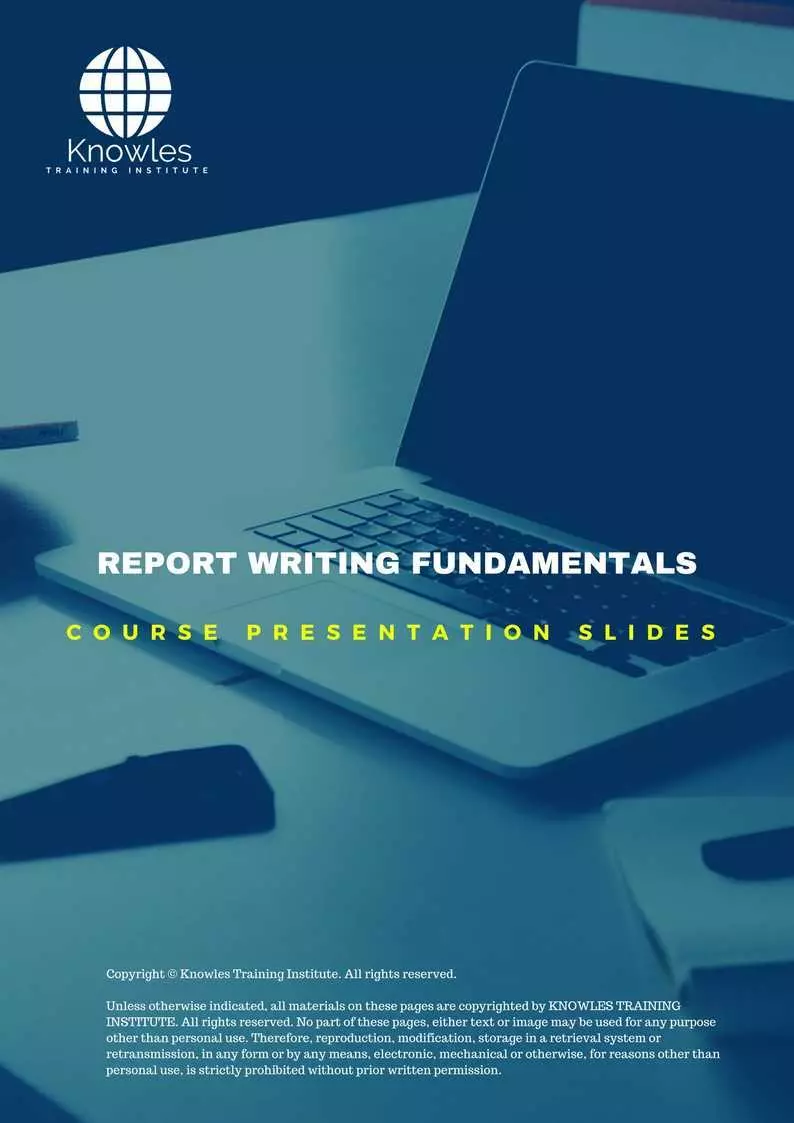
Report Writing Fundamentals Long-Term Memory Flashcards Pack
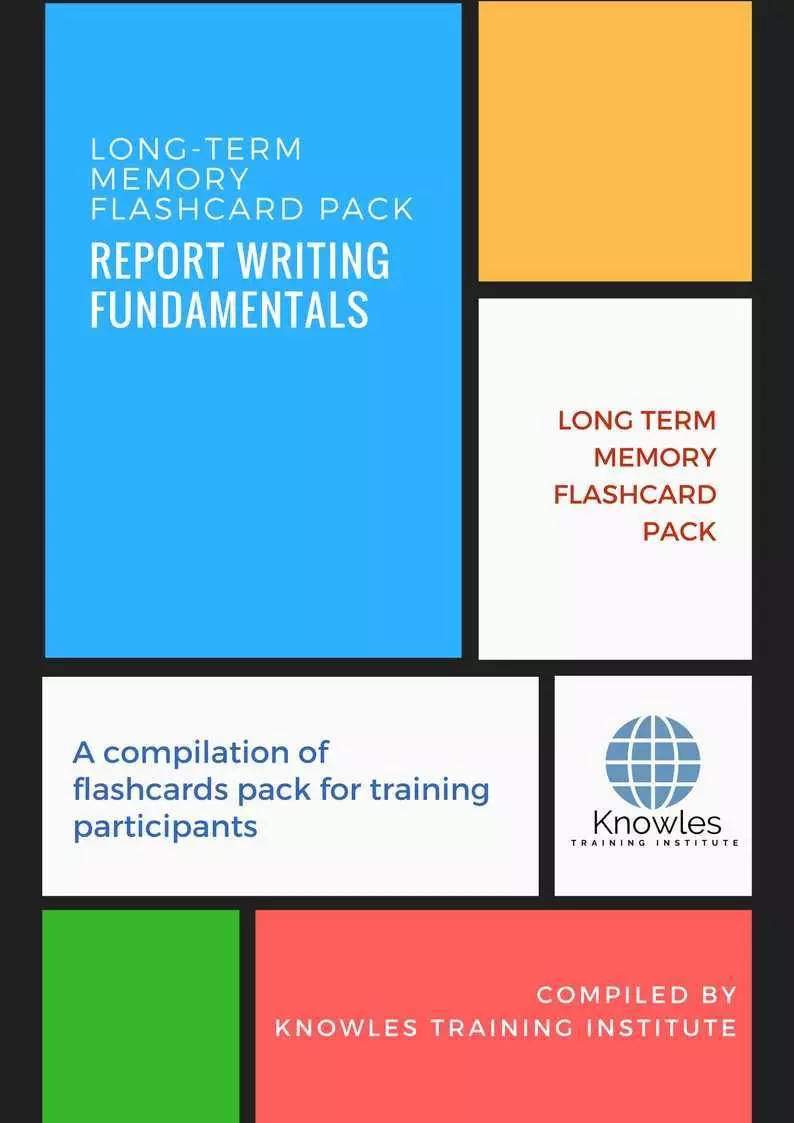
Report Writing Fundamentals E-Learning Course
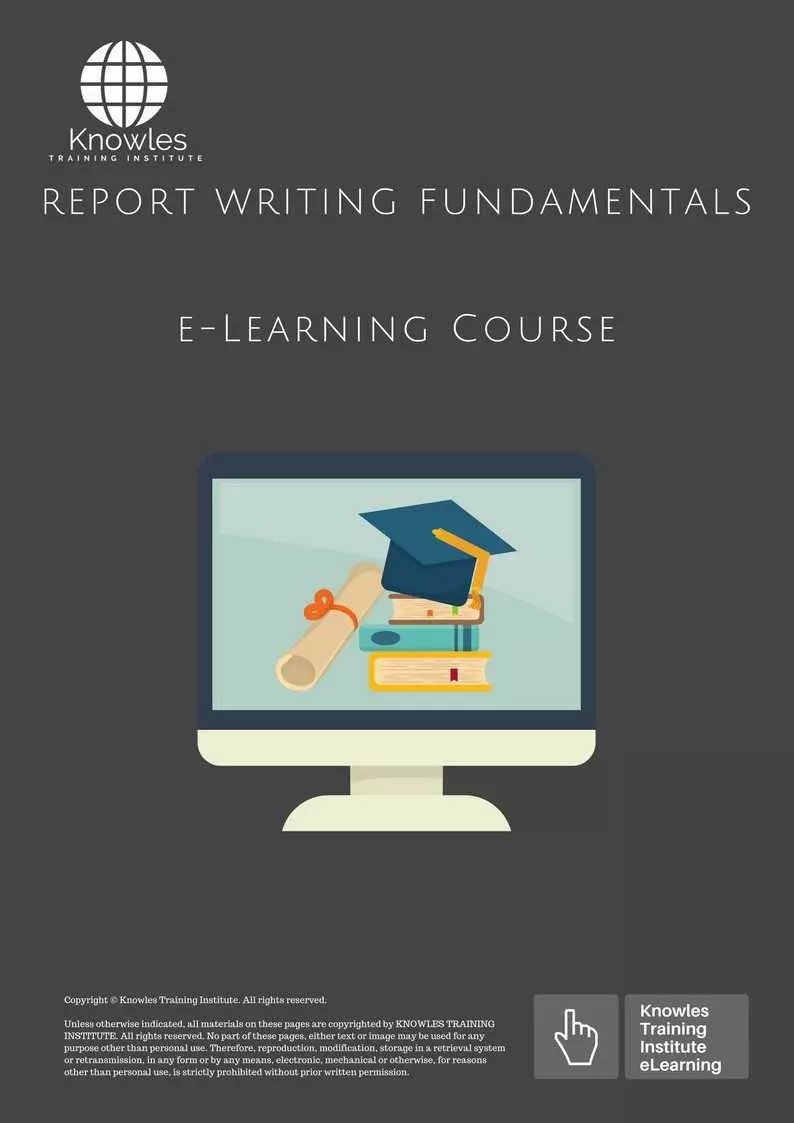
Report Writing Fundamentals Online Video Course
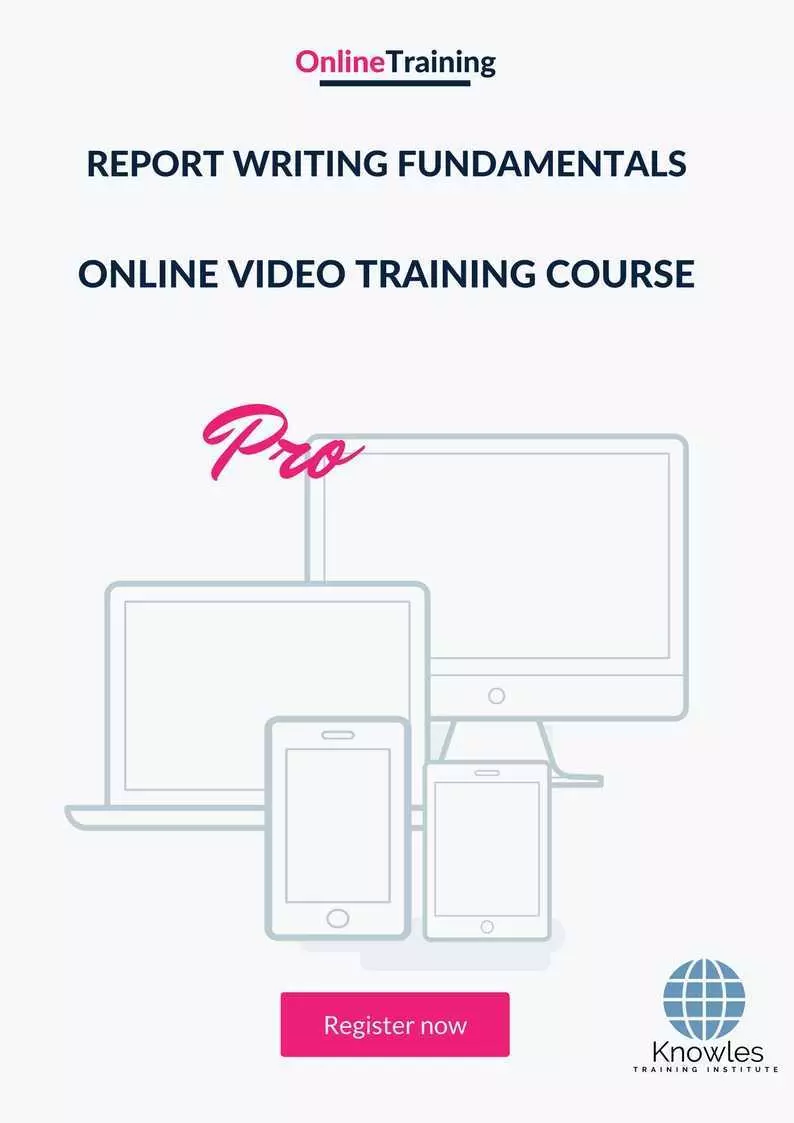
Report Writing Fundamentals Essentials Audiobook
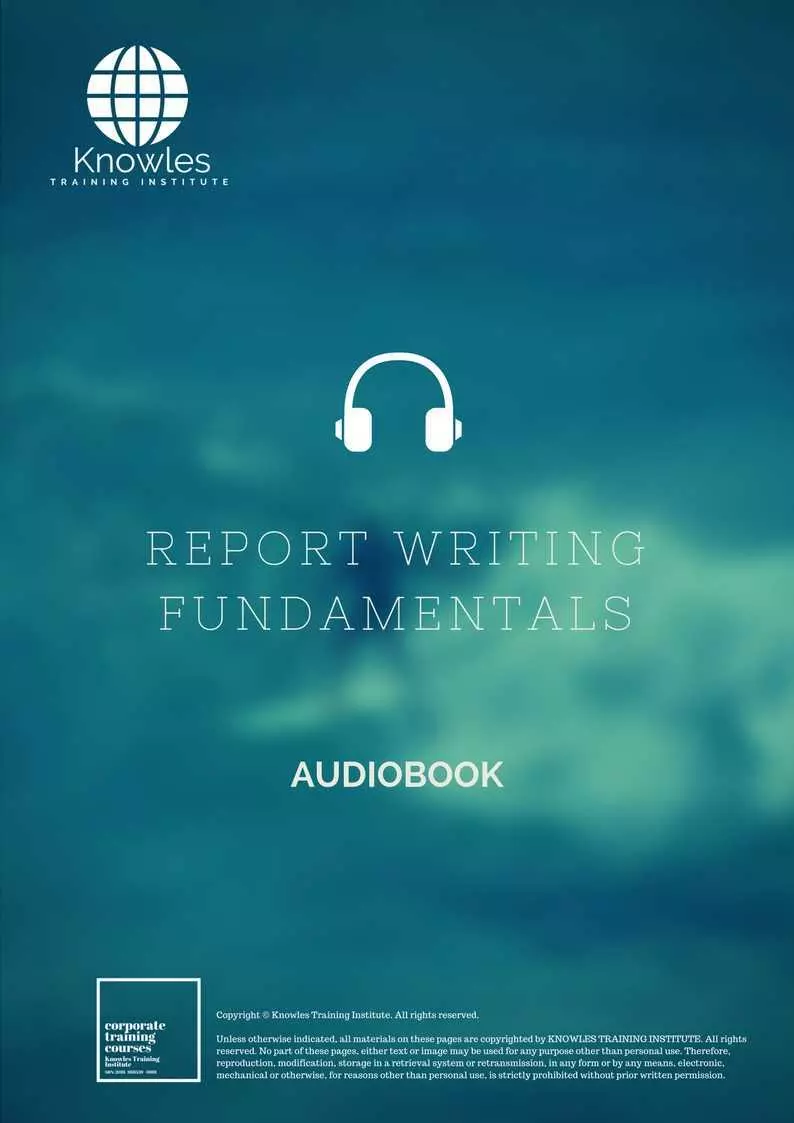
Report Writing Fundamentals Infographics Pack
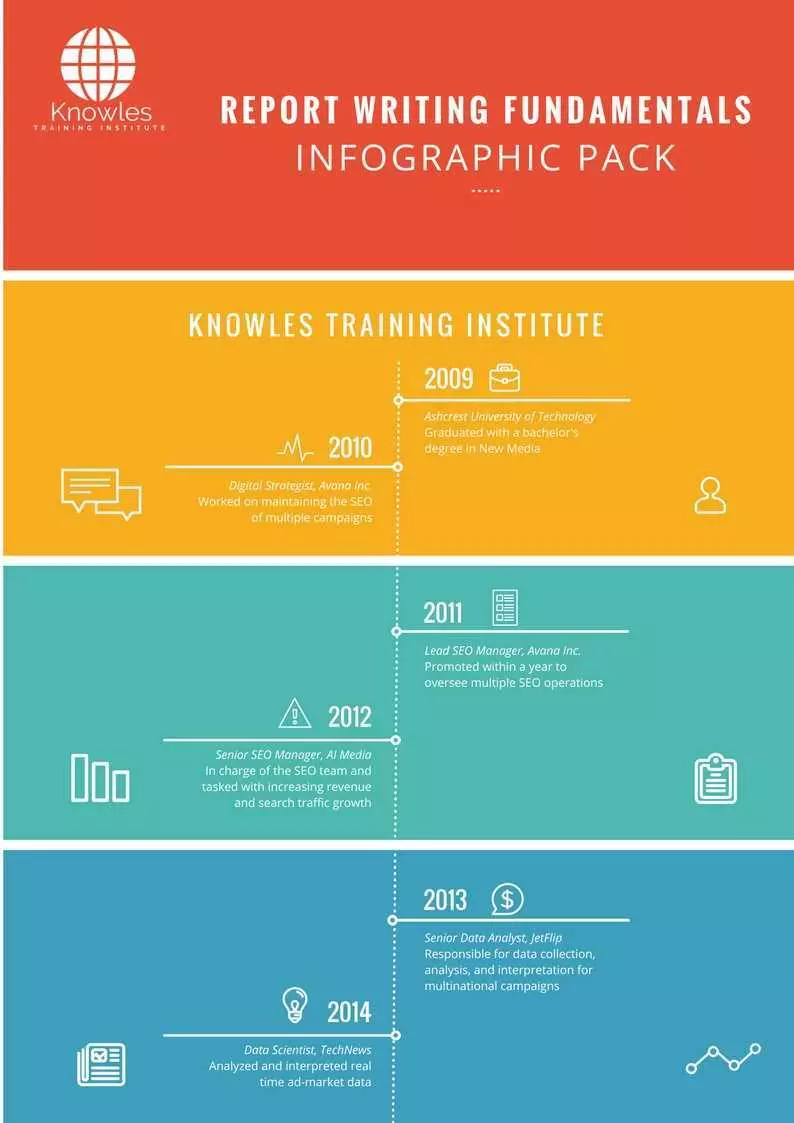
Report Writing Fundamentals Certification
Each course participant will receive a certification of training completion
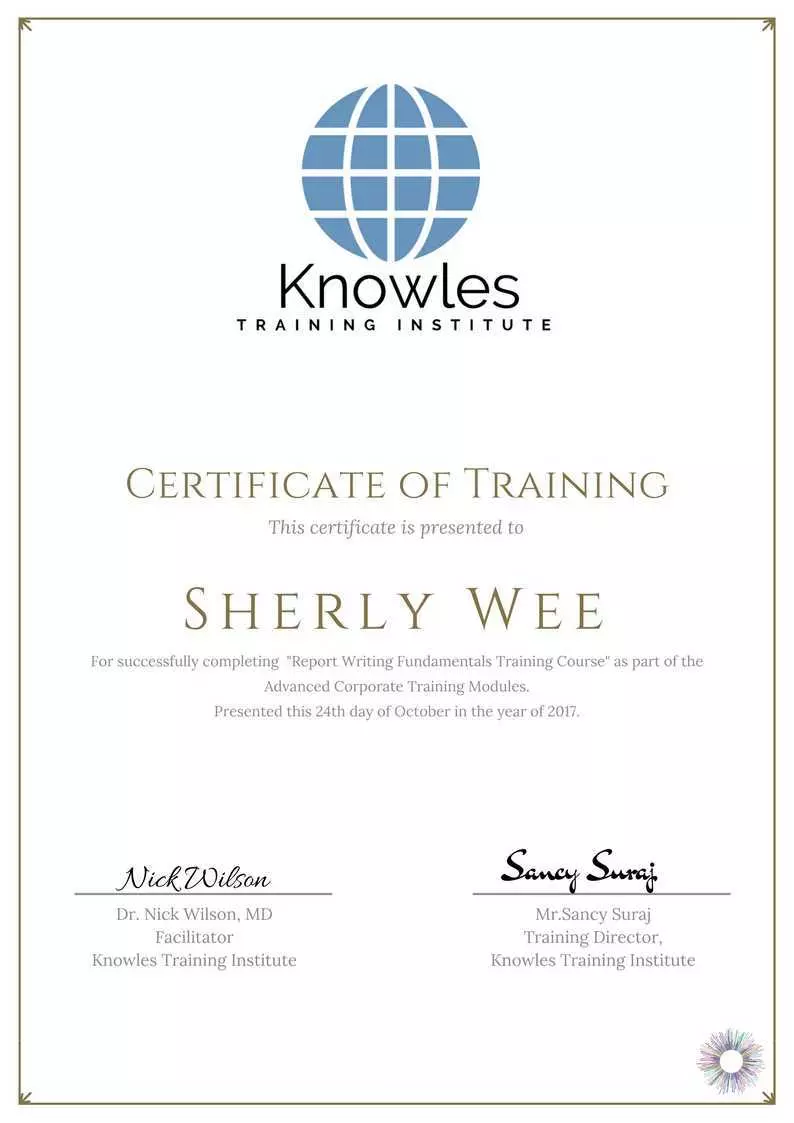
Course Fees
There are 4 pricing options available for this Report Writing Fundamentals training course. Course participants not in Singapore may choose to sign up for our online Report Writing Fundamentals training course.
- SGD 889.97 For a 60-minute Lunch Talk Session.
- SGD 389.97 For a Half Day Course Per Participant.
- SGD 589.97 For a 1 Day Course Per Participant.
- SGD 789.97 For a 2 Day Course Per Participant.
Discounts available for more than 2 participants.
Upcoming Report Writing Fundamentals Training Course Schedule
Contact us for the latest Report Writing Fundamentals course schedules:
Phone: +65 6714 6663
Email: contact@knowlesti.com
Message:
Download Report Writing Fundamentals Course Brochure
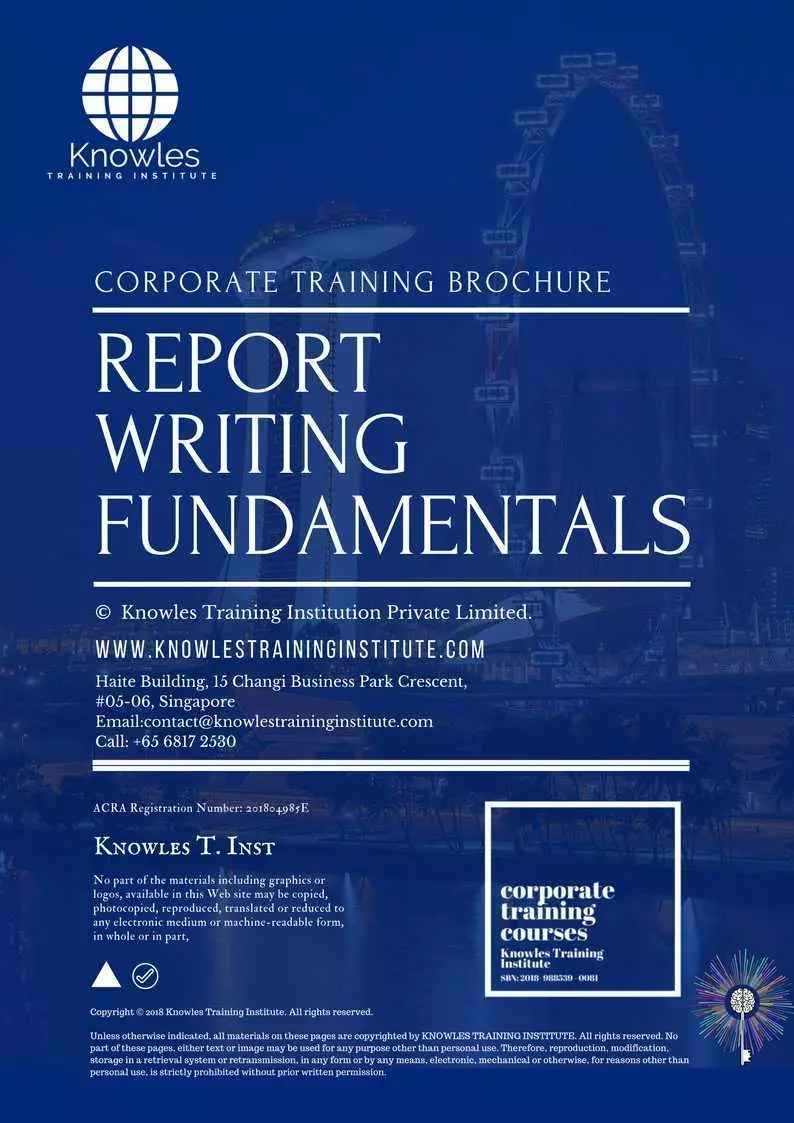
Request for this Report Writing Fundamentals course brochure. Fill up the short information below and we will send it to you right away!
Post-Training Support: A vast majority of training does not have any effect beyond 120 days. But to work, training has to have a strong pre- and post-training component. Post-training reinforcement consequently helps individuals to recall the understanding and ask questions.
Blended Learning: Learning does not occur in the classroom. Virtually everybody prefers distinct ways of learning. Successful learning should have a multi-channel, multi-modal strategy.
We Understand The Industry: Similarly, we’ve got a profound comprehension of the business, business design, challenges, strategy and the that our participants are in and have designed the courseware to cater to their professional needs.
Course Content: Knowles Training Institute’s material is relevant, of high quality and provide specific learning outputs. As a result, Participants will leave the training course feeling as they have gained a strong understanding and will also be in a position to execute what they have learned sensibly.
Course Development — The workshop modules follow a systematic and logical arrangement. Therefore, this structure helps to ensure that the course material allows the facilitators to deliver the course in a logical arrangement. Consider the subjects as building bricks into learning, our facilitators slowly build towards a comprehensive picture of this entire topic.
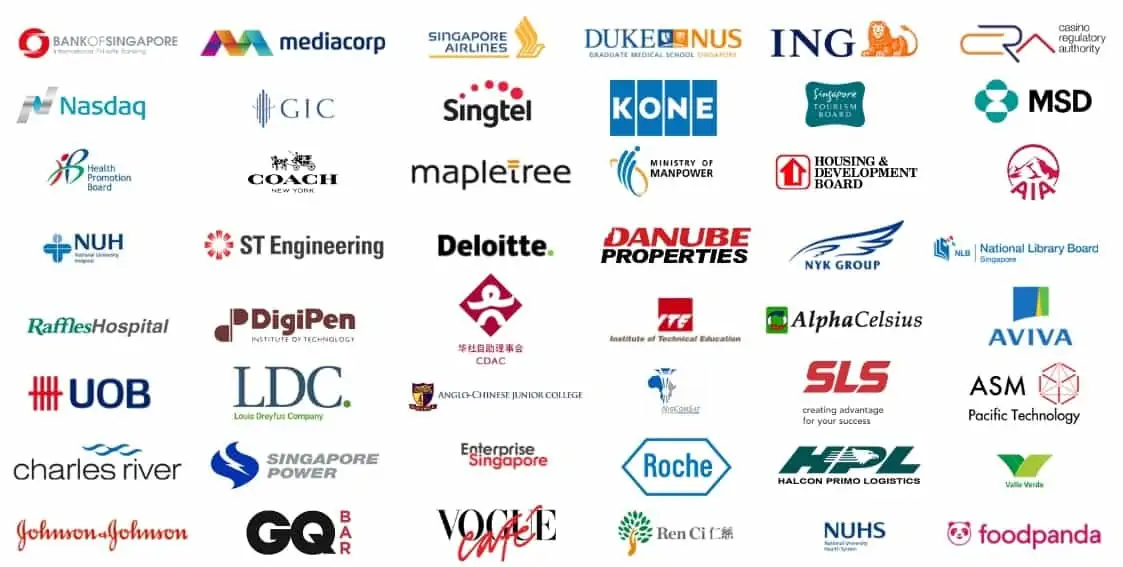

Course Enquiries
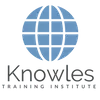
Fill up the form and we will get back to you in less than 1 working day.
Alternatively, give us a call to have one of our training consultants contact you. Our corporate training courses can be contextualized to meet your organization’s training needs. Leverage on our large pool of professional trainers and consultants for your organization’s training needs.
Office Address: 60 Paya Lebar Rd, #07-54 Paya Lebar Square, Singapore 409051
Office Phone: +65 6714 6663
Email: contact@knowlesti.sg
We Guarantee 100% Privacy. We Respect Your Privacy. Your Information Will Never Be Shared.
Questions
Step 1: Determine the scope and limitations of the report
Step 2: Plan the procedure to follow for generating the report.
Step 3: Gather information.
Step 4: Settle on the structure.
Step 5: Draft the Findings and Appendices
Step 6: Analyse the findings and make conclusions.
Step 7: Suggest recommendations.
Step 8: Finally draft the executive summary and table of contents.
A report should generally contain the following:
- A description of a sequence of events or a situation;
- An interpretation of the importance of these events – whether a personal view or view of others, academic referencing should be made;
- An evaluation of the facts or the results of the study;
- A discussion of probable outcomes of future courses of action;
- A recommended course of action
- Conclusions.
An excellent report should:
- Show that the purpose of the report brief is understood, and the report adheres to its specifications.
- Collect, assess and examine important information;
- Present its contents in a logical and coherent order;
- make proper conclusions that are backed by the evidence and analysis of the report;
- make intelligent and useful recommendations.
A report examines a topic that is structured and in an easy-to-follow format. A report is not an essay, which sets out to support a writer’s view about a topic and does not have to feature headings.
Reports structure their contents into sections with headings and subheadings as follows:
- Title
- Summary
- Introduction
- Body
- Discussion
- Conclusion
- Recommendations
- Appendices
Letter of Transmittal:
The letter of transmittal begins the purpose and content of the report.
Title Page:
The only difficulty in designing the title page is to think of a good title.
Abstract:
An abstract is a brief technical summary – usually no more than 200 words – of the report.
Table of Contents:
For readers to easily navigate to the desired pages of the report
List of Illustrations:
A table of contents for the diagrams, figures, and tables of a report.
Executive Summary:
A one-page condensation of the report.
- Title Page – The heading of the report.
- Table of Contents – To give a bird’s eye view of the report
- List of Figures – This part contains the figures and pictures which are used by the report.
- Abstract or Summary – The Synopsis of the report
- Introduction
- Body of the Report
- Recommendations
- Conclusion
There are eight types of report. Although experts are still undecided on a global classification standard, these report categories are the most frequently used. They are:
- Formal or Informal Reports
- Short or Long Reports
- Informational or Analytical Reports
- Proposal Report
- Vertical or Lateral Reports
- Internal or External Reports
- Periodic Reports
- Functional Reports.
Through research and analysis of data, reports communicate information.
A written report is a means to assess the real value of research. Other relevant criteria include the report’s clarity, organization and content.
One reason why reports are a common form of writing in the industry is their inclusion of recommendations, as they are useful for decision making.
Here are a few reasons why a report is important:
- Tracks Development Over Time
Business reports documents progress and provide a means of comparing periods, project details, and growth history.
- Provides an Audit Trail
Reports build a paper trail of the past and assists decision-making for a company and its future.
- Duty to Stakeholders
Most big companies must produce an annual report each year for their shareholders and government agencies.
- Supports Purchasing Decisions
To expand or make a substantial purchase to increase business, a report about the financial history of the company is necessary.
You might have to write an academic report at university or a business report as part of your job.
Other reasons to prepare a report are to present information; to present research results; or to analyse a dilemma and then prescribe a particular action or strategy.
A report can be extended or compact, formal or informal. The style and vocabulary election will depend on who is going to read your report and the audience’s level of understanding or expertise.
Reports compile the result of research and analysis of data and issues into useful information.
Reports can survey a broad range of topics but usually focus on transmitting information with a clear purpose, to a specific audience.
As a written report is the tangible product of many hours of work, it is the mode of assessing the real value of research.
Rightly or wrongly, the quality and worth of that work are judged by the quality of the written report – its clarity, organization and content.
A report is a particular form of writing tailored to concisely identify and examining issues or findings that have occurred in a physical sense, such as findings from a research investigation.
They can also pertain to events or issues identified within a body of literature. A report informs the reader only and objectively about all relevant issues. Three features characterise report writing at a fundamental level: a pre-defined order, independent sections, and unbiased determinations.
The primary purpose of a business report is to present data that is relevant to the company, such as the efficiency of work processes, competition, or procedures, readily available to the company’s stakeholders. The report needs to make this data accessible for the reader to follow.
A database report is the formatted result of database queries and contains valuable data for decision-making and analysis.
Most business applications include a built-in reporting tool; this is simply an interface that calls or runs formatted database queries for easy application usage. For example, a banking software application may contain reports on all customers with large deposits.
A Report in business communication is a document designed to note and carry information to the reader. Reports are inevitable in any business or organization; they serve to record specific information for audiences, goals, or functions. They are often distinguished by their purpose or function.
Begin with a cover page beginning with the name, the date and a short title that sums up the report’s contents.
Eliminate unnecessary features in a regular report, such as a table of contents and appendices full of graphs and charts. Include a small graphic or two to support the narrative of the report.
This opening section of the simple report should be less than a page long. Readers may be too busy to devote complete attention to the report due to their other commitments.
This section should be a brief explanation of the report’s opinion and a summary of the essential parts of the rest of the report.
There are seven essential stages of writing a report:
Stage One: Constructing the report brief.
Stage Two: Collecting and picking information.
Stage Three: Categorising the information.
Stage Four: Analysing the information.
Stage Five: Writing the report.
Stage Six: Evaluating and redrafting.
Stage Seven: Presentation.
There are four types of conclusion available for use:
Predict: If the report is about an action already taken, use the ending to propose the desired outcome.
Quote: If done with care and sensitivity, ending with a quotation can be powerful.
Repeat: Repeat a significant issue and do it with tactfulness without being rough. Keep it brief, to-the-point and memorable.
Summarise: Be concise, memorable and compelling.
A conclusion sums up the entire report. It draws judgments from what has been found and the impact of those findings or decisions. It reinforces the main messages of the document, provides a final word to the readers, and demonstrates good organization.


